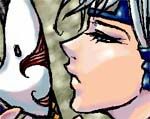What if you could cast gate without a target, and the spell would summon a demon that would follow you around and you could command?
i.e.
cast 'gate'
You summon a glabrezu from the gates of the Abyss.
The demons could be based on skill with the spell.
Inept: Dretch
Amateur: Quasit
Novice: Babau
Apprentice: Vrock
Journeyman: Bebilith
Adept: Hezrou
Expert: Glabrezu
Master: Marilith
Grandmaster: Balor
Now, depending on your level of the spell, you could summon anything from your level and down. So if you are at apprentice, you could summon a vrock, babau, quasit, or a dretch.
Also, beware higher levels of the spell, because Glabrezu, Marilith, or Balors would all have a chance of resisting your command and going wild, attacking you and anyone around you when they are summoned.
A sanctuary spell would prevent the last three from attacking you, but they still might attack others.
A protection from evil spell would mean that the demon would not go wild and would be under your command.
Now, note, this would not take away the already used use of the spell of opening a portal to someone you wish. Or for an alternative, this could be merely a different spell available to high level conjurers (or to whoever gets it depending on the new spell lists being created).
Just an idea I had for the evil wizardly option of summoning demons.
Feedback is always welcome.






